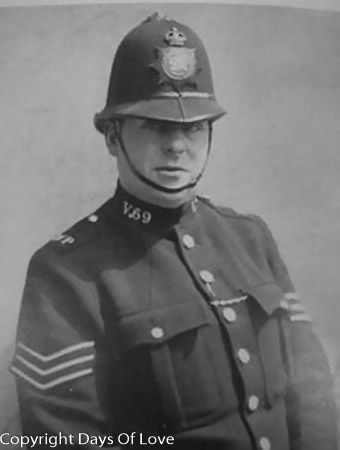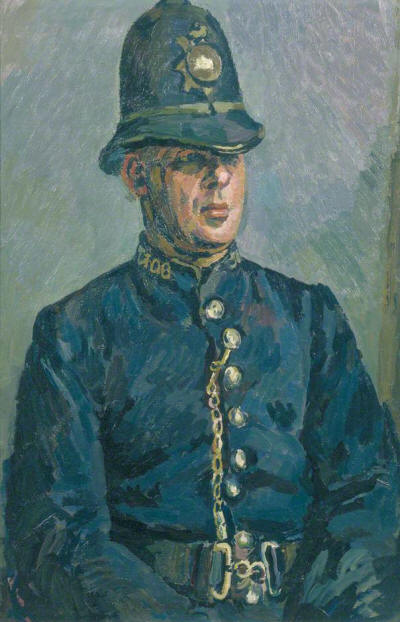

Queer Places:
Paddenswick Rd, Hammersmith, London W6 0UA, UK
Hillview Cottage, 78 Pixham Ln, Dorking RH4 1PH, UK
Box Hill, Tadworth KT20 7LF, Regno Unito
 Harry
Daley of Dorking (November 14, 1901 – March 12, 1971), was a Metropolitan Policeman, Merchant Seaman and
one-time lover of the novelist E.M. Forster.
Harry
Daley of Dorking (November 14, 1901 – March 12, 1971), was a Metropolitan Policeman, Merchant Seaman and
one-time lover of the novelist E.M. Forster.
Harry was born in Lowestoft, Suffolk in 1901 into a close-knit, working-class family. His father, Joseph, was the skipper of a fishing smack and his family originated from Bermondsey in South London. He was lost at sea in the Lowestoft fleet disaster of 1911. Harry’s brother, also known as Joseph, served in World War I but was tragically killed in action on 7 November 1918, just a few days before the war came to an end. After leaving school, Harry found work as a Post Office telegraph boy. When the family moved to Dorking in Surrey in 1916, he worked as a grocery delivery boy but craved the bright lights of London.
In his posthumous autobiography, This Small Cloud (1987), he admitted that his lack of ambition led him to take the first real job that came along, a delivery boy for the select grocers Kinghams. Delivering throughout the Dorking area, he called at Lord Ashcombe’s House, as well as Polesden Lacey, the home of famous Edwardian hostess, the Hon. Mrs Greville. He met the Prime Minister, Bonar Law, the infamous Marie Stopes and media magnate Lord Beaverbrook.
Daley realised he was gay at an early age. He had always felt different and kept himself apart from other children, immersing himself in books, the theatre and art galleries. Throughout my life I have had a recurrent nightmare in which, having just been married, I lead my beautiful bride to the church door. At this point I cry out in despair “Oh what a bloody fool I am” and I wake sweating gradually realising that I have not really ruined two lives.
In 1914, he met a young seaman, Nobby Clark. He joined the police force in 1925 and was soon aware that his homosexuality was widely known both among his colleagues and higher officers.

Police Constable Harry Daley (1901–1971)
Duncan Grant (1885–1978)
Guildhall Art Gallery
Daley met gay author J.R. Ackerley, after being stationed in Hammersmith as a constable. Burton quotes P N Furbank, the freelance writer and critic who wrote the forward to This Small Cloud: ‘They met casually in the street early one morning and by pleasant chance it turned out in conversation that Daley, who was an indefatigable theatergoer, had seen a production of Ackerley’s play The Prisoners of War at the Lyric, Hammersmith. It initiated a long, indeed a lifelong, friendship, and quite soon, through Ackerley, Daley had become friendly with quite a number of Ackerley’s literary and artistic acquaintances, amongst them Raymond Mortimer, Duncan Grant, Gerald Heard, Leo Charlton, and E.M. Forster.”
Harry was persuaded by Ackerley, who was then working for the BBC, to make some radio broadcasts on the Home Service, talking about his experiences ‘on the beat’ and the criminal activity he encountered on London’s streets. Reluctantly Harry agreed and the broadcasts were subsequently published in The Listener magazine. Later, in the 1940s, Harry wrote a number of short stories and submitted them to Ackerley, now literary editor of The Listener but none were ever published. However, it was Ackerley who encouraged Harry to write his memoirs following his retirement from the Police.
In 1926, Harry, now part of the Bloomsbury Set, began his short relationship with E.M. Forster, who found him worryingly indiscreet. Daley then struck up a relationship with the artist Duncan Grant, who painted a portrait of Harry in uniform, now in the Guildhall Art Gallery in the City of London. In this social circle he also became friends with Edward Sackville-West, Desmond Shawe-Taylor and other figures in the literary and musical world. His social life in the late 1920s and early 1930s was certainly gay and all-embracing. There were many parties where several men fell in love with him but he was attracted to what he described as normal men, older, rougher and stronger than himself.
Just short of retirement, Harry was employed as Master-At-Arms in the Merchant Navy. Retired from the Merchant Navy, he gardened and nursed his Siamese cat. He died in 1971. His ashes were scattered on Box Hill.
Reflecting on his life, he wrote: My life has been delightful and given a chance by God or somebody of another life at the end of this then I’d say without hesitation, Same Again, please!
My published books: